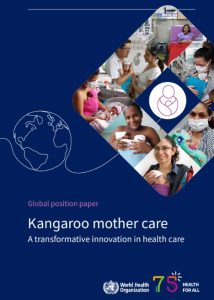
Retrieved from WHO Global Position Paper
The World Health Organization (WHO) has launched new guidelines for improving maternal and newborn health outcomes through infant- and family-centred developmental care. The guidelines highlight Kangaroo Mother Care (KMC), a neonatal care practice which includes skin-to-skin contact, as a life-saving intervention for preterm- and low birth weight (LBW) babies. To support the implementation of KMC, the WHO developed a global position paper and an implementation strategy for easy scale-up and adaptation to different countries. These resources aim to integrate KMC into national and international programmes and promote political commitment, policy changes, dedicated budgets, advocacy, and partnerships.
The World Health Organization (WHO) has released new global guidelines for maternal and newborn health, prioritising infant- and family-centred developmental care to improve outcomes for preterm and low birth weight (LBW) babies (< 2.5 kg). Globally, there are 20.5 million LBW babies and 14.8 million preterm births each year, most occurring in low- and middle-income countries. These infants face many challenges, including a higher risk of infections, growth impairment, and neurodevelopmental delays. Newborn mortality, mainly due to complications from preterm birth, also remains a significant cause of death among children under the age of five.
One key component of the guidelines is Kangaroo Mother Care (KMC). The WHO defines three elements as comprising KMC:
- Continuous and prolonged skin-to-skin contact (8-24 hours a day), initiated immediately after birth
- Exclusive breastfeeding/breastmilk feeding
- Timely discharge from the neonatal intensive care unit (NICU) /the hospital, with close monitoring and further skin-to-skin contact
With a history spanning almost 40 years, KMC has been recognised and recommended globally as a life-saving intervention. It can significantly improve outcomes for preterm or LBW infants, including reducing hypothermia and sepsis. KMC also promotes the baby’s cognitive and motor development, paternal mental health, and parent-infant bonding. Additionally, the practice of KMC encourages breastfeeding, bringing further nutritional benefits for the baby. Recent evidence suggests that starting KMC within 72 hours of birth for preterm and LBW infants, regardless of clinical stability, decrease the risk by 25%.
The WHO and its partners believe that scaling up KMC can address health inequities and improve worldwide maternal and newborn health outcomes. However, despite other long-standing WHO guidelines and national policies, KMC coverage has remained low, with only 32% of reporting countries having updated policies or guidelines on KMC. Suspected reasons for past difficulties lie in a lack of consensus on priorities and concept definitions, as well as in low commitment from nations around the world. As history shows, implementing KMC can be challenging, and overcoming barriers will require a paradigm shift in newborn care models.
In order to facilitate new approaches to newborn care and to support the implementation of KMC for all preterm and LBW babies, the WHO has developed two new resources: a global position paper and a thorough implementation strategy. The two documents were launched on 16 May 2023 and aim to present the joint position and vision of an expert working group, providing background information, evidence, and rationale for making KMC available to every newborn. The Nutrition Strategic and Technical Advisory Group of Experts and the European Foundation for the Care of Newborn Infants (EFCNI) contributed significantly to developing these documents.
The global position paper illustrates new findings and evidence-based recommendations for preterm care and clarifies the expectations for countries and their healthcare systems regarding their standard of care. It calls for action and collaboration from various stakeholders, such as policymakers, programme managers, healthcare professionals, civil society leaders, and researchers, to scale up KMC as the standard of care for all families. The global position paper also urges national governments, ministries of health and finance, professional associations, parents, civil society, donor organisations, academicians, and the private sector to support the implementation of KMC. This can be done through policy changes, dedicated budgets, endorsement, advocacy, and resource mobilisation.
Complementary to the global position paper, the implementation strategy of the WHO serves as a resource for policymakers, programme managers, healthcare providers, and organisations working in maternal and newborn care to anticipate some barriers and create an easier path to better care. Some of the key recommendations to guide countries in implementing KMC for preterm and LBW babies include:
- Developing national and hospital guidelines to promote infant- and family-centred developmental care
- Integrating and promoting KMC within existing healthcare systems as part of standard care for all preterm or LBW babies
- Growing facilities with an infrastructure that allows for easy skin-to-skin contact and parental presence 8-24 hours a day, starting immediately after birth
- Training healthcare staff to help involve caregivers in caring for newborn infants and provide them with emotional and psychological support
- Encouraging new policies such as additional parental leave and entitlements to help foster the needed family involvement
- Strengthening political leadership and dedicated budgets in favour of KMC policies
- Encouraging national planning, coordination, and partnerships with other nations
- Monitoring, evaluation, and continuous quality improvement of programmes and policies promoting KMC
- Tailoring the strategy to specific settings through research and planning
Implementing KMC on a global scale requires national and international commitment, and all nations are responsible for improving maternal and newborn health. There is a promising future through such essential practices, and the new global position paper on KMC, together with the implementation strategy, are two great starting points for better equitable care.
Read the global position paper ‘Kangaroo mother care – A transformative innovation in health care’ (WHO)
Read the document ‘Kangaroo mother care – Implementation strategy for scale-up adaptable to different country contexts’ (WHO)
EFCNI Academy page for KMC: https://www.efcni.org/activities/efcni-academy/kmc/
DOI of the article at “The Lancet”: https://doi.org/10.1016/S0140-6736(23)01000-0
Full list of authors: World Health Organization

